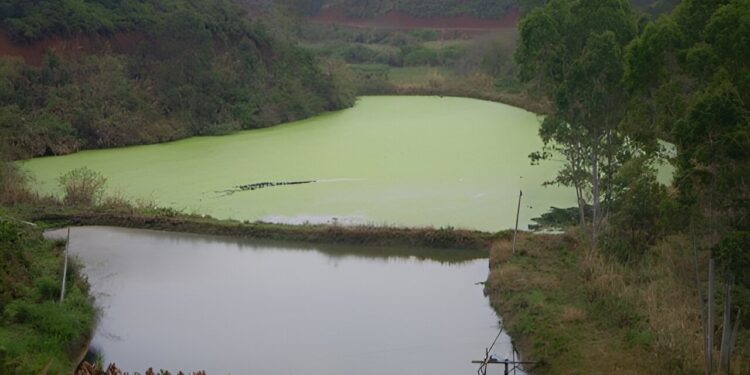Eutrophication of a lake in China. Credit: Mengru Wang
Water shortages could affect three billion more people than expected by mid-century, with increased pollution making river sources “dangerous” for humans and wildlife, researchers warned on Tuesday.
The UN climate science panel said about half of the world’s population currently faces severe water shortages for at least one month a year and warned that the impacts of global warming and Increased demand poses major risks to global supply.
But new research by scientists in Germany and the Netherlands has shown that if harmful nitrogen pollution is taken into account, the number of areas considered water scarce increases significantly.
“In general, people are more worried about water scarcity, whether you have enough,” lead author Mengru Wang, of Wageningen University and Research, told AFP.
“But I also see that water pollution is becoming a growing problem that makes water unfit for use by nature and humans.”
Human activities release large amounts of nitrogen, pathogens, chemicals and plastics into water systems.
Nitrogen, particularly from agricultural fertilizers, contributes to the growth of algae which can choke waterways, threaten marine life and compromise water quality.
The new study, published in the journal Natural communicationsanalyzed river basins around the world, which are key sources of drinking water and hubs of urban and economic activity.
According to the authors’ computer modeling, the number of sub-basins (smaller units within river basins) facing severe water shortages was twice as high as previously thought in 2010 and could worsen in the future. decades to come.
They estimate that in 2010, 2,517 sub-basins worldwide faced water scarcity, when the impact of nitrogen pollution on water quality is taken into account, compared to just 984 according to conventional assessments based on quantity.
That figure could rise to 3,061 by 2050, they estimate, estimating that this would affect about 6.8 to 7.8 billion people, about three billion more than conventional estimates.
Co-author Benjamin Bodirsky, a senior scientist at the Potsdam Institute for Climate Impact Research, said modeling three different scenarios affecting pollution levels showed that “we have choices and can improve the situation” .
But he added that even in the most optimistic estimates, nitrogen pollution would remain at “substantial levels” in important agricultural areas like Europe, China and India.
“The deterioration of access to water can be halted, and even reversed to some extent, by adopting more efficient use of fertilizers as well as a more vegetarian diet, and by connecting a greater proportion of the population world in water treatment facilities,” Bodirsky said.
More information:
Mengru Wang et al, A three-fold increase in global river basins with water shortages due to future pollution, Natural communications (2024). DOI: 10.1038/s41467-024-44947-3
© 2024 AFP
Quote: Pollution risks worsening global water shortage: study (February 6, 2024) retrieved on February 6, 2024 from
This document is subject to copyright. Apart from fair use for private study or research purposes, no part may be reproduced without written permission. The content is provided for information only.



